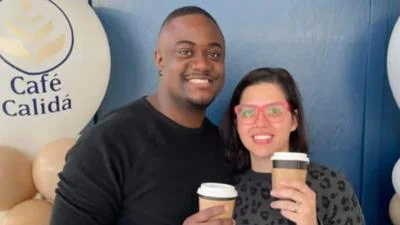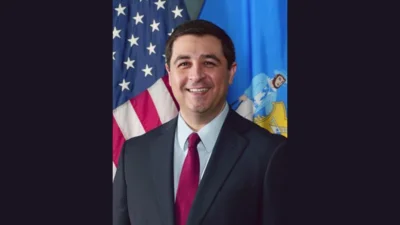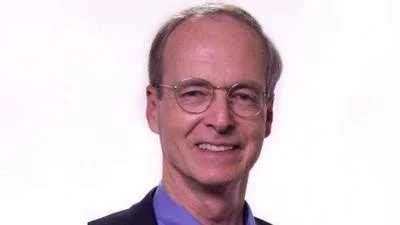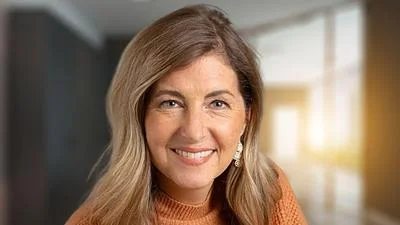Denise Dailey, Psy.D., was only 10 years old when both of her parents were deployed abroad in support of the global war on terrorism following the 9/11 attacks.
“I can remember how that dismantled my family system,” said Dr. Dailey, who is one of five children. “I remember what it was like to be part of that journey of missing them. It opened my eyes to the extreme stress that servicemembers are under when separated from their families.”
Dr. Dailey credits that experience, at a critical age, as what sparked her professional interest in military psychology — specifically helping combat veterans with post-traumatic stress disorder and those experiencing homelessness.
“It was a progression between clinical training and my lived experiences as a dependent of combat veterans that led me to have a curiosity and scientific inquiry about the amount of stress servicemembers experience across the deployment cycle,” she said.
On Nov. 6, she’ll be among the 285 graduates to walk across the stage at The Chicago Theatre during the Adler University Commencement Ceremony, which celebrates the 375 degrees conferred to students from the Chicago and Online campuses during the 2021-22 academic year. Dr. Dailey completed the Doctor of Psychology in Clinical Psychology program this summer. It’ll be her second Adler commencement ceremony after she finished the Online Master of Arts in Psychology: Specialization in Military Psychology program in 2016.
Four days after receiving her doctoral degree, Dr. Dailey will join her mentor, Adler associate professor Joseph E. Troiani, Ph.D., to present at the virtual Illinois Psychological Association Annual Convention. Their presentation, “The Behavioral Health Consequences of the COVID-19 Pandemic,” will examine the history of pandemics, its impact on society, and the implications of providing post-pandemic behavioral health care.
Removing barriers to PTSD treatment
Since this summer, Dr. Dailey has been mainly focused on her yearlong residency at the Road Home Program at Rush University Medical Center, serving as a psychologist embedded within their intensive outpatient program and conducting innovative research on PTSD treatment.
The typical PTSD treatment involves psychotherapy once or twice a week for about three months, Dr. Dailey said.
“However, the Road Home Program’s research initiatives focus on massed treatment, which prioritizes attending cognitive processing therapy twice a day for 10 days and integrates complementary health services such as acupuncture, art therapy, DBT-skill groups, and chaplain services into programming to supplement therapeutic processes,” she said.
The goal: To figure out the dose of treatment needed for recovery from PTSD. The study has the potential to improve access to care and remove barriers to treatment, such as taking time off work and transportation issues.
“I’m hopeful I can use this experience to gain a specialty on massed treatment and apply it to historically marginalized and oppressed communities, including Black and Brown communities, and veterans impacted by homelessness and severe mental illness,” she said.
’A leader in the military psychology community’
Dr. Dailey first enrolled at Adler in 2014 in the Online Master of Arts in Psychology: Specialization in Military Psychology program. She graduated in 2016, moved to Chicago in 2017 and enrolled in the Doctor of Psychology in Clinical Psychology program. In 2021, she packed up her life, and drove to El Paso, Texas. She did a one-year APA-accredited internship at the El Paso VA Health System.
“That training experience helped me develop diverse clinical approaches to treat servicemembers with severe psychopathology across clinical settings, as I was embedded as clinician within primary care and specialty behavioral health clinics,” she said. “Additionally, my clinical experiences included an administration rotation, where I focused on streamlining procedures for referral services to enhance veterans’ access to group psychotherapy and address shared cultural elements that can contributed to treatment barriers for veterans and their families.”
Five years later, she became the first Adler student to transition from the Online Master of Arts in Psychology: Specialization in Military Psychology program to the Doctor of Psychology in Clinical Psychology program and successfully complete her studies. Her dissertation explored the lived experiences of post-9/11 veterans who have received the diagnosis with PTSD.
“I could not be any prouder of Dr. Dailey’s emerging role as a clinical psychologist and leader in the military psychology community,” Dr. Troiani said. “Her passion is to help those who are currently serving or have served in the military along with their partners and families without limits. For me, it is comforting to see the next generation of amazing psychologists, such as Dr. Dailey, step forward.”
Among the highlights of Dr. Dailey’s higher education journey include receiving a presidential citation from the American Psychological Association’s Division 19: Society for Military Psychology in recognition of her work with veterans who experienced homelessness and building out local programs that increase access to complementary and alternative medicine. These programs included equine, art, massage, and music therapies.
“These treatments are often only available to people with an abundance of resources and access to care,” she said. “It is my mission to continue hosting mental health initiatives within marginalized communities to increase health literacy about evidence-based treatment options to address PTSD and mental health conditions that often co-occur alongside trauma-related disorders such as insomnia, chronic pain, depression, anxiety, and substance-use disorders.”
In addition, she developed COVID-19 behavioral health programs for homeless veterans diagnosed with COVID-19 and/or impacted by social isolation during lockdown.
“It was important to make sure that we help veterans manage their stress levels while recovering from respiratory and cardiovascular incidence that stemmed from health complications related to COVID-19 infection” Dr. Dailey said.
Her pandemic-related work also involved examining its psychological impact on society.
“I was working across three COVID-19 clinics, along with acute skilled nursing facilities and homeless shelters,” Dr. Dailey said. “The burnout I was seeing was devastating. There will likely be decades of long-lasting psychological consequences, and we’ll need to address them long after the pandemic is contained.”
She first started looking into the psychological consequences on health care professionals, specifically those working in Veteran Affairs clinics, but her independent research expanded to other groups, including young adults and those in low-income communities. She’ll present many of her findings during the IPA annual convention on Nov. 11 with Dr. Troiani.
“Dr. Dailey is a thoughtful and reflective student with a most inquiring mind,” Dr. Troiani said. “From the beginning, she embraced and practiced what our University is all about, which is seeking and putting social justice, equity, and diversity into action.”
Original source can be found here.





 Alerts Sign-up
Alerts Sign-up